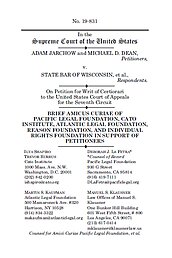Learn more about Cato’s Amicus Briefs Program.
Adam Jarchow is a lawyer in Wisconsin who is compelled to pay dues to the state bar association if he wishes to practice law in the state. The annual dues vary based on membership classification and run from $258 for full dues-paying members to $173 for nonvoting judicial members. Membership dues fund about half of the bar association’s annual expenditures.
The Wisconsin State Bar Association is very politically active. For example, it supports insurance coverage for abortions in policies sold on a state-operated exchange and adding “sexual orientation” and “gender identity” to state anti-discrimination laws. The bar has also made many disparaging comments about the Trump administration.
Jarchow partially funds the bar association’s political activities through his bar dues. Because he disagrees with many of the bar’s positions, Jarchow sued to be released from the compelled-membership and compelled-dues requirements. The First Amendment not only protects the freedom to speak, it protects the freedom not to speak and not to be forced to subsidize speech. Moreover, in 2018, the Court decided Janus v. AFSCME, holding that the First Amendment prohibited mandatory public-sector union fees for non-member employees. That decision would seem to call into question two earlier decisions, Lathrop and Keller, which upheld compelled-dues bar associations.
Jarchow lost at the district court and the Seventh Circuit because Lathrop and Keller are still the controlling Supreme Court precedents, as Jarchow acknowledged. Now on petition to the Supreme Court, Jarchow asks the Court to rectify the obvious inconsistencies between Janus and Lathrop and Keller and hold that compelled-dues bar associations are as unconstitutional as compelled-dues public-sector unions. Cato has joined the Pacific Legal Foundation, the Atlantic Legal Foundation, the Reason Foundation, and the Individual Rights Foundation on an amicus brief urging the Supreme Court to take the case. We argue that bar associations across the country routinely engage in blatantly political activities, including taking positions on gun control, environmentalism, abortion, and much more. Using mandatory dues to fund those activities implicates deep First Amendment concerns. Moreover, while many bar associations allow members to opt-out of funding some political activities, even that concession implicates the First Amendment. Bar associations should not be allowed to presume that its members support the association’s political activities unless the members affirmatively opt-out.
Janus was an important decision about compelled speech, and its logic applies equally to ideologically driven bar associations. The Court should take Jarchow’s case and reaffirm the principles of Janus.

This work is licensed under a Creative Commons Attribution-NonCommercial-ShareAlike 4.0 International License.


